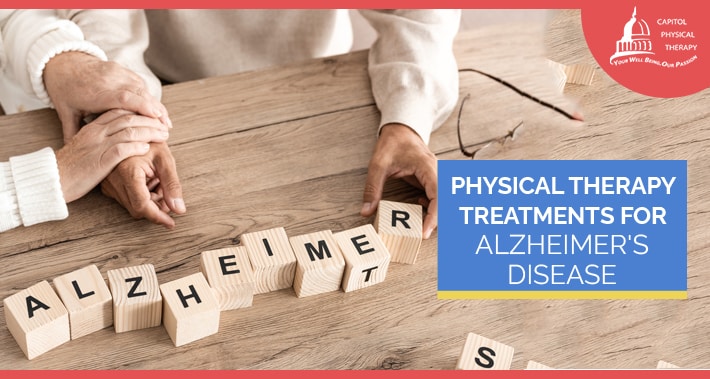
As we age, our brain’s functions may begin to decline.
In someone with Alzheimer’s disease, brain cell loss causes this decline to progress rapidly.
Receiving a diagnosis of Alzheimer’s disease is undoubtedly a scary experience; however, an Alzheimer’s disease physical therapist can help.
At Capitol Physical Therapy, we offer physical therapy for seniors with Alzheimer’s disease.
Keep reading to learn more about Alzheimer’s disease and the key role that our DC physical therapists play in slowing the disease’s progression.
What Is Alzheimer’s Disease?
Alzheimer’s disease is a progressive condition that damages brain cells and subsequently affects how we speak, move, think, and interact with others.
Alzheimer’s disease causes memory loss and makes it difficult to perform everyday tasks, such as bathing and using the toilet.
Approximately 10% of Americans over the age of 65 are currently living with Alzheimer’s disease.
What Causes Alzheimer’s Disease?
The exact cause of Alzheimer’s disease is still unknown; however, it is likely due to a combination of factors.
One of the biggest risk factors for developing Alzheimer’s disease is advanced age, with most diagnoses occurring after the age of 65.
While family history can play a role in the disease’s development, most people who are diagnosed don’t have a family history.
Symptoms Of Alzheimer’s Disease
There are 10 warning signs of possible Alzheimer’s disease.
These include:
- Changes in memory
- Difficulty making decisions, planning, and solving problems
- Difficulty completing common tasks, such as washing the dishes
- Confusion about time and/or place
- Difficulty understanding images and the relationship between objects
- Difficulty finding the right words to use when speaking or writing
- Losing items and being unable to retrace your steps to find them
- Poor safety judgment
- Withdrawal from work or other social activities
- Changes in mood and/or personality
As the disease progresses, you may get lost in places that were once familiar.
In later stages, you may experience restlessness, often occurring in the afternoon or evening.
In the last stages of Alzheimer’s disease, you may need help with simple tasks, such as bathing and dressing.
You may also falsely believe that others are lying to you or conspiring against you, but this is because it can be difficult to recognize you have a problem if you have Alzheimer’s disease.
The ability to walk usually stays intact until the very last stages.
However, difficulties with balance and strength may lead to an increased risk of falling.
Because of the nature of Alzheimer’s disease symptoms, it’s generally the loved one of somebody with Alzheimer’s that seeks out treatment.
How Is Alzheimer’s Disease Diagnosed?
There isn’t a single method of testing for Alzheimer’s disease; however, researchers are getting closer to being able to diagnose Alzheimer’s disease with the aid of brain imaging.
Health care providers, including physical therapists, are trained to spot the early warning signs and will provide a referral if they suspect that you could be developing the disease.
Your medical team may perform numerous tests to determine how well your brain is functioning.
How Can Physical Therapy For Alzheimer’s Disease Help?
Physical therapy can’t reverse the effects of Alzheimer’s disease, but it can help slow its onset.
A recent study published in 2020 supports that regular exercise can slow the progression of the condition and even delay one third of onsets worldwide.
Physical therapists are movement experts and will work with your support network to ensure that you can continue to live an active life for as long as possible.
In the early stages of the disease, your physical therapist will help you stay mobile to continue to perform your roles at home and at work.
In the later stages, your physical therapist will help improve your quality of life and delay the need for facility based treatment.
Additionally, physical therapy can help the symptoms of Alzheimer’s disease in four ways:

1. It Can Delay The Onset Of Memory Loss
Your physical therapist can help you stay active in order to promote blood flow to your brain, thus delaying the onset or slowing the process of memory loss.
Physical therapy has also been shown to help in the growth of the hippocampus, which is responsible for memory.
It can reduce the damage that Alzheimer’s disease does to the gray and white matter in your brain.
Plus, your physical therapist will recommend activities that are low impact, and age appropriate for your condition.
One common example is cycling because of the many benefits it can offer while being low impact, and easily accessible on indoor machines.
If you’re earlier in your progression of Alzheimer’s, your physical therapist might recommend running.
Your physical therapist will also teach you how to safely warm up before you exercise and how to relieve any soreness after you exercise.
The goal is to get the benefits of exercise without any negative effects like pulling a muscle or otherwise injuring yourself.
2. It Can Increase Mobility
People with Alzheimer’s disease are often at a high risk for falls.
And because Alzheimer’s is most commonly a disease of old age, it can often accompany other diseases common in seniors, such as:
- Parkinson’s disease
- Multiple sclerosis
- A stroke
- Osteoarthritis
- Osteoporosis
- A history of traumatic brain injury
Each of the above can either leave you more prone to falling, or make a potential fall riskier.
Your physical therapist can help strengthen your muscles in order to prevent injury from falls.
Additionally, regular physical therapy can help build muscle memory, which allows your body to respond to movement even when your brain is struggling.
Some great activities that increase strength and mobility that your physical therapist may recommend are yoga, and pilates.
3. It Can Improve Mood
Aggression and depression are common symptoms of Alzheimer’s disease.
By helping you to stay active, your physical therapist can also help with your mood.
Physical therapy involves stretches and exercises that target the release of endorphins in your brain, which contribute to feeling your mental best.
Regular exercise can also help minimize aggression.
RELATED: Can Physical Therapy Help With Mental Health?
4. It Can Help Maintain Independence
In the later stages of Alzheimer’s disease, daily activities such as eating, bathing, and toileting may become increasingly difficult.
Your physical therapist can help provide opportunities to strengthen your muscles so you can continue performing these tasks independently.
Your physical therapist can also help your support network set up a safe environment in your home.
Can You Prevent Alzheimer’s Disease?
The exact cause of Alzheimer’s disease is still unknown.
However, regular physical activity may be able to reduce your risk of developing the disease.
A 2019 study by Kouloutbani et al found that regular physical activity helps stabilize Alzheimer’s disease progression, as well as improve cognitive functions.
Thus, a physical therapist plays a key role in the prevention of Alzheimer’s disease progression.
Book Your Appointment With Capitol Physical Therapy Today
At Capitol Physical Therapy, we’re here to help you or your loved one stay active and independent as long as possible.
Let us help you or your loved one live life to its fullest.
Book your appointment with Capitol Physical Therapy today.
1331 H St NW #200,
Washington, DC 20005
- https://g.page/capitolptdc
9560 Pennsylvania Ave. # 202,
Upper Marlboro, MD 20772
- https://goo.gl/maps/zjL4NnnuThRhrcS86
Capitol Physical Therapy offers orthopedic and other pain related solutions, with our versitile team of physical therapists in Washington, DC